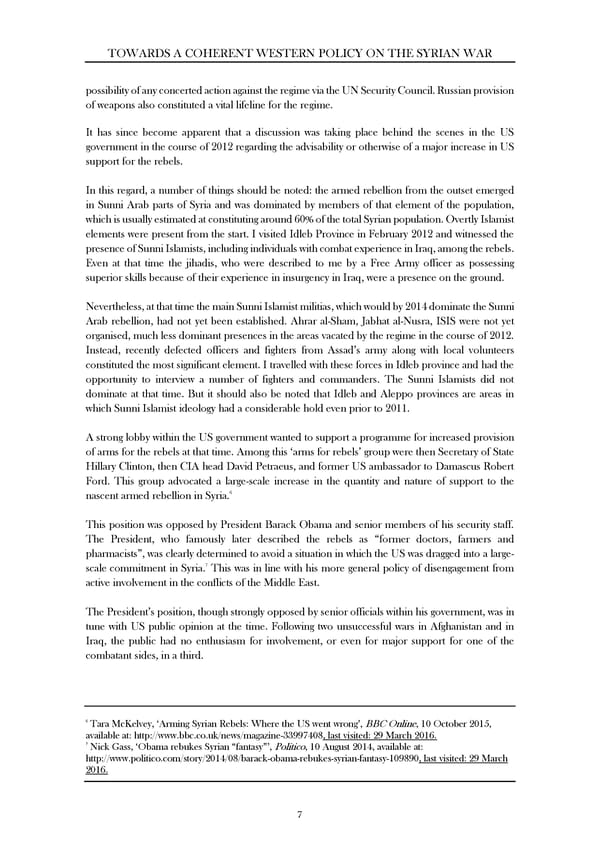TOWARDS A COHERENT WESTERN POLICY ON THE SYRIAN WAR possibility of any concerted action against the regime via the UN Security Council. Russian provision of weapons also constituted a vital lifeline for the regime. It has since become apparent that a discussion was taking place behind the scenes in the US government in the course of 2012 regarding the advisability or otherwise of a major increase in US support for the rebels. In this regard, a number of things should be noted: the armed rebellion from the outset emerged in Sunni Arab parts of Syria and was dominated by members of that element of the population, which is usually estimated at constituting around 60% of the total Syrian population. Overtly Islamist elements were present from the start. I visited Idleb Province in February 2012 and witnessed the presence of Sunni Islamists, including individuals with combat experience in Iraq, among the rebels. Even at that time the jihadis, who were described to me by a Free Army officer as possessing superior skills because of their experience in insurgency in Iraq, were a presence on the ground. Nevertheless, at that time the main Sunni Islamist militias, which would by 2014 dominate the Sunni Arab rebellion, had not yet been established. Ahrar al-Sham, Jabhat al-Nusra, ISIS were not yet organised, much less dominant presences in the areas vacated by the regime in the course of 2012. Instead, recently defected officers and fighters from Assad’s army along with local volunteers constituted the most significant element. I travelled with these forces in Idleb province and had the opportunity to interview a number of fighters and commanders. The Sunni Islamists did not dominate at that time. But it should also be noted that Idleb and Aleppo provinces are areas in which Sunni Islamist ideology had a considerable hold even prior to 2011. A strong lobby within the US government wanted to support a programme for increased provision of arms for the rebels at that time. Among this ‘arms for rebels’ group were then Secretary of State Hillary Clinton, then CIA head David Petraeus, and former US ambassador to Damascus Robert Ford. This group advocated a large-scale increase in the quantity and nature of support to the 6 nascent armed rebellion in Syria. This position was opposed by President Barack Obama and senior members of his security staff. The President, who famously later described the rebels as “former doctors, farmers and pharmacists”, was clearly determined to avoid a situation in which the US was dragged into a large- scale commitment in Syria.7 This was in line with his more general policy of disengagement from active involvement in the conflicts of the Middle East. The President’s position, though strongly opposed by senior officials within his government, was in tune with US public opinion at the time. Following two unsuccessful wars in Afghanistan and in Iraq, the public had no enthusiasm for involvement, or even for major support for one of the combatant sides, in a third. 6 Tara McKelvey, ‘Arming Syrian Rebels: Where the US went wrong’, BBC Online, 10 October 2015, available at: http://www.bbc.co.uk/news/magazine-33997408, last visited: 29 March 2016. 7 Nick Gass, ‘Obama rebukes Syrian “fantasy”’, Politico, 10 August 2014, available at: http://www.politico.com/story/2014/08/barack-obama-rebukes-syrian-fantasy-109890, last visited: 29 March 2016. 7
 Towards A Coherent Policy On The Syrian War Page 8 Page 10
Towards A Coherent Policy On The Syrian War Page 8 Page 10